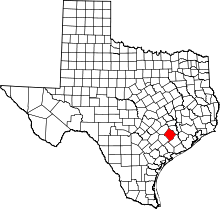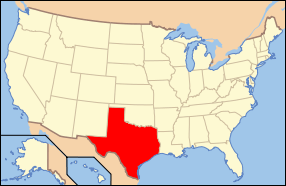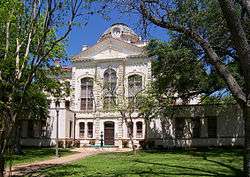Colorado County, Texas
| Colorado County, Texas | |
|---|---|
|
The Colorado County Courthouse is a classical revival building erected in 1890-1891. The structure was added to the National Register of Historic Places on June 17, 1982. It is undergoing major renovation in 2013-2014. | |
 Location in the U.S. state of Texas | |
 Texas's location in the U.S. | |
| Founded | 1837 |
| Named for | Colorado River |
| Seat | Columbus |
| Largest city | Columbus |
| Area | |
| • Total | 974 sq mi (2,523 km2) |
| • Land | 960 sq mi (2,486 km2) |
| • Water | 13 sq mi (34 km2), 1.4% |
| Population | |
| • (2010) | 20,874 |
| • Density | 22/sq mi (8/km²) |
| Congressional district | 10th |
| Time zone | Central: UTC-6/-5 |
| Website |
www |
Colorado County is a county located in the U.S. state of Texas. As of the 2010 census, its population was 20,874.[1] Its county seat is Columbus.[2] It is named for the Colorado River of Texas. The county was founded in 1836 and organized the next year.[3][4]
Geography
According to the U.S. Census Bureau, the county has a total area of 974 square miles (2,520 km2), of which 960 square miles (2,500 km2) is land and 13 square miles (34 km2) (1.4%) is water.[5]
Major highways
Adjacent counties
- Austin County (northeast)
- Wharton County (southeast)
- Jackson County (south)
- Lavaca County (southwest)
- Fayette County (northwest)
National protected area
Demographics
| Historical population | |||
|---|---|---|---|
| Census | Pop. | %± | |
| 1850 | 2,257 | — | |
| 1860 | 7,885 | 249.4% | |
| 1870 | 8,326 | 5.6% | |
| 1880 | 16,673 | 100.3% | |
| 1890 | 19,512 | 17.0% | |
| 1900 | 22,203 | 13.8% | |
| 1910 | 18,897 | −14.9% | |
| 1920 | 19,013 | 0.6% | |
| 1930 | 19,129 | 0.6% | |
| 1940 | 17,812 | −6.9% | |
| 1950 | 17,576 | −1.3% | |
| 1960 | 18,463 | 5.0% | |
| 1970 | 17,638 | −4.5% | |
| 1980 | 18,823 | 6.7% | |
| 1990 | 18,383 | −2.3% | |
| 2000 | 20,390 | 10.9% | |
| 2010 | 20,874 | 2.4% | |
| Est. 2015 | 20,870 | [6] | 0.0% |
| U.S. Decennial Census[7] 1850–2010[8] 2010–2014[1] | |||
As of the census[9] of 2000, there were 20,390 people, 7,641 households, and 5,402 families residing in the county. The population density was 21 people per square mile (8/km²). There were 9,431 housing units at an average density of 10 per square mile (4/km²). The racial makeup of the county was 72.79% White, 14.80% Black or African American, 0.37% Native American, 0.21% Asian, 0.02% Pacific Islander, 10.04% from other races, and 1.78% from two or more races. 19.74% of the population were Hispanic or Latino of any race.
There were 7,641 households out of which 31.10% had children under the age of 18 living with them, 56.30% were married couples living together, 10.90% had a female householder with no husband present, and 29.30% were non-families. 26.20% of all households were made up of individuals and 14.40% had someone living alone who was 65 years of age or older. The average household size was 2.56 and the average family size was 3.08.
In the county, the population was spread out with 25.60% under the age of 18, 8.90% from 18 to 24, 23.80% from 25 to 44, 23.10% from 45 to 64, and 18.60% who were 65 years of age or older. The median age was 39 years. For every 100 females there were 95.30 males. For every 100 females age 18 and over, there were 92.40 males.
The median income for a household in the county was $32,425, and the median income for a family was $41,388. Males had a median income of $30,063 versus $20,014 for females. The per capita income for the county was $16,910. About 12.30% of families and 16.20% of the population were below the poverty line, including 21.00% of those under age 18 and 15.80% of those age 65 or over.
Communities
Cities
- Columbus (county seat)
- Eagle Lake
- Weimar
Towns
Unincorporated communities
Ghost Towns
See also
- List of museums in East Texas
- National Register of Historic Places listings in Colorado County, Texas
References
- 1 2 "State & County QuickFacts". United States Census Bureau. Retrieved December 9, 2013.
- ↑ "Find a County". National Association of Counties. Archived from the original on 2011-05-31. Retrieved 2011-06-07.
- ↑ Mark Odintz (June 12, 2010). "Colorado County". Handbook of Texas Online. Texas State Historical Association. Retrieved June 20, 2015.
- ↑ "Colorado County". Texas Almanac. Texas State Historical Association. Retrieved June 20, 2015.
- ↑ "2010 Census Gazetteer Files". United States Census Bureau. August 22, 2012. Retrieved April 21, 2015.
- ↑ "County Totals Dataset: Population, Population Change and Estimated Components of Population Change: April 1, 2010 to July 1, 2015". Retrieved July 2, 2016.
- ↑ "U.S. Decennial Census". United States Census Bureau. Archived from the original on May 11, 2015. Retrieved April 21, 2015.
- ↑ "Texas Almanac: Population History of Counties from 1850–2010" (PDF). Texas Almanac. Retrieved April 21, 2015.
- ↑ "American FactFinder". United States Census Bureau. Archived from the original on 2013-09-11. Retrieved 2011-05-14.
External links
| Wikisource has the text of an 1879 American Cyclopædia article about Colorado County, Texas. |
- Colorado County government’s website
- Colorado County in Handbook of Texas Online at the University of Texas
- Weimar Information and Events
- Columbus Information and Events
 |
Fayette County | Austin County |  | |
| |
||||
| ||||
| | ||||
| Lavaca County | Jackson County | Wharton County |
Coordinates: 29°37′N 96°31′W / 29.62°N 96.52°W

